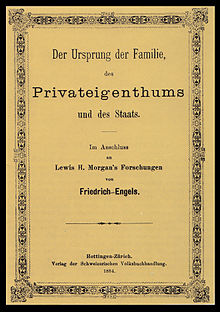Origins of the Family, Private Property, and the State

First edition (1884)
|
|
| Author | Friedrich Engels |
|---|---|
| Original title | Der Ursprung der Familie, des Privateigenthums und des Staats |
| Language | German |
|
Publication date
|
1884 |
|
Published in English
|
1902 |
The Origin of the Family, Private Property, and the State: in the Light of the Researches of Lewis H. Morgan (German: Der Ursprung der Familie, des Privateigenthums und des Staats) is an 1884 historical materialist treatise by Friedrich Engels. It is partially based on notes by Karl Marx to Lewis H. Morgan's book Ancient Society (1877). The book is an early anthropological work and is regarded as one of the first major works on family economics.
Following the death of his friend and co-thinker Karl Marx in 1883, Friedrich Engels served as his literary executor, actively organizing and preparing for publication various writings of his scholarly friend. This activity, while time consuming, did not fully occupy Engels' available hours, however, and he managed to persevere reading and writing on topics of his own.
While his 1883 manuscript Dialectics of Nature faltered, remaining uncompleted and unpublished, a greater success was achieved in the spring of 1884 with the writing and publication in Zurich of Der Ursprung der Familie, des Privateigenthums und des Staats: Im Anschluss an Lewis H. Morgan's Forschungen (The Origin of the Family, Private Property, and the State: in the Light of the Researches of Lewis H. Morgan).
Writing of The Origin of the Family began early in April 1884, with the project completed on 26 May. Engels began his work on the subject after reading Marx's handwritten synopsis of a book by pioneering anthropologist Lewis H. Morgan, Ancient Society; or, Researches in the Lines of Human Progress from Savagery, Through Barbarism to Civilization, first published in London in 1877. Engels believed it clear that Marx had intended upon a critical book-length treatment of the ideas first broached by Morgan and determined to produce such a manuscript as a means of fulfilling a literary behest of his late comrade.
...
Wikipedia
